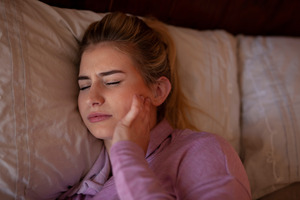
TMJ disorder is well-known for causing chronic pain in the jaw. However, the discomfort isn’t the only potential effect that the condition can have. Research has shown that TMJ disorder can potentially contribute to sleep problems – most notably sleep apnea. Before you get the treatment you need, it’s worth taking the time to learn more about how TMJ disorder and sleep apnea can be connected.
What is TMJ Disorder?
A TMJ disorder is an issue involving the temporomandibular joint (TMJ for short) that keeps the lower jaw connected to the rest of the skull. The joint can potentially become injured or overworked, resulting in pain and dysfunction. TMJ disorder often results in significant jaw discomfort as well as headaches.
What is Sleep Apnea?
Sleep apnea is when your breathing stops and restarts multiple times while you’re asleep. In most cases, sleep apnea occurs when the airway is blocked by collapsed tissues in your mouth or throat. The repeated cessations of breathing can force your brain to keep waking your body up, making it very difficult to get a good night’s sleep.
How Can TMJ Disorder Lead to Sleep Apnea?
Roughly 43% of people with TMJ disorder also have sleep apnea or another type of sleep-related issue. This can be attributed to the fact that TMJ disorder is often associated with a misaligned jaw. Consequently, your jaw may be positioned in a manner that narrows your airway while you’re asleep, potentially leaving you more susceptible to obstructions that can result in sleep apnea episodes.
It’s worth noting that the connection can go the other way as well. If your airway is blocked, your body may attempt to open it by moving the lower jaw forward, which can put additional stress on your jaw joints if it happens multiple times a night. As such, your sleep apnea and TMJ disorder can end up contributing to each other, making the symptoms of both conditions even worse.
How Can TMJ Disorder and Sleep Apnea Be Treated?
It’s in your best interest to have TMJ disorder and sleep apnea treated as soon as possible. Oftentimes, a Vivos DNA oral appliance can be used to reduce the stress that your jaw joints are exposed to, thus alleviating your TMJ disorder symptoms. Similarly, an oral appliance can change the position of your lower jaw, thus keeping your airway open and lowering your risk for sleep apnea episodes.
Do you suspect that you might be suffering from sleep apnea and TMJ disorder? Now’s the right time to reach out to a local TMJ and sleep specialist who can help you find the solution you’ve been looking for.
About the Practice
At Exceptional Dentistry Pain & Sleep Solutions, our team includes multiple TMJ & sleep specialists under a single roof. We’re proud to offer the Vivos DNA oral appliance for treating sleep apnea as well as occlusal splints and other treatment options for TMJ disorder. To schedule a consultation with us at our Silver Spring office, visit our website or call (301) 460-3331.
